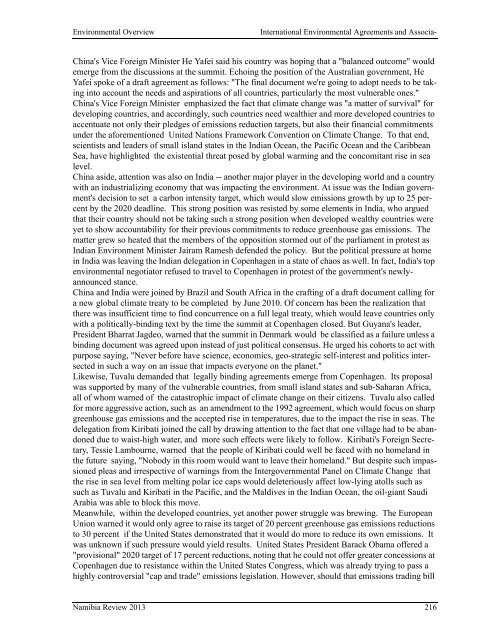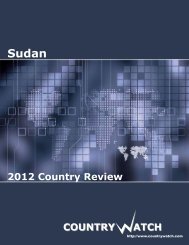Namibia - CountryWatch
Namibia - CountryWatch
Namibia - CountryWatch
You also want an ePaper? Increase the reach of your titles
YUMPU automatically turns print PDFs into web optimized ePapers that Google loves.
Environmental Overview International Environmental Agreements and Associa-<br />
China's Vice Foreign Minister He Yafei said his country was hoping that a "balanced outcome" would<br />
emerge from the discussions at the summit. Echoing the position of the Australian government, He<br />
Yafei spoke of a draft agreement as follows: "The final document we're going to adopt needs to be taking<br />
into account the needs and aspirations of all countries, particularly the most vulnerable ones."<br />
China's Vice Foreign Minister emphasized the fact that climate change was "a matter of survival" for<br />
developing countries, and accordingly, such countries need wealthier and more developed countries to<br />
accentuate not only their pledges of emissions reduction targets, but also their financial commitments<br />
under the aforementioned United Nations Framework Convention on Climate Change. To that end,<br />
scientists and leaders of small island states in the Indian Ocean, the Pacific Ocean and the Caribbean<br />
Sea, have highlighted the existential threat posed by global warming and the concomitant rise in sea<br />
level.<br />
China aside, attention was also on India -- another major player in the developing world and a country<br />
with an industrializing economy that was impacting the environment. At issue was the Indian government's<br />
decision to set a carbon intensity target, which would slow emissions growth by up to 25 percent<br />
by the 2020 deadline. This strong position was resisted by some elements in India, who argued<br />
that their country should not be taking such a strong position when developed wealthy countries were<br />
yet to show accountability for their previous commitments to reduce greenhouse gas emissions. The<br />
matter grew so heated that the members of the opposition stormed out of the parliament in protest as<br />
Indian Environment Minister Jairam Ramesh defended the policy. But the political pressure at home<br />
in India was leaving the Indian delegation in Copenhagen in a state of chaos as well. In fact, India's top<br />
environmental negotiator refused to travel to Copenhagen in protest of the government's newlyannounced<br />
stance.<br />
China and India were joined by Brazil and South Africa in the crafting of a draft document calling for<br />
a new global climate treaty to be completed by June 2010. Of concern has been the realization that<br />
there was insufficient time to find concurrence on a full legal treaty, which would leave countries only<br />
with a politically-binding text by the time the summit at Copenhagen closed. But Guyana's leader,<br />
President Bharrat Jagdeo, warned that the summit in Denmark would be classified as a failure unless a<br />
binding document was agreed upon instead of just political consensus. He urged his cohorts to act with<br />
purpose saying, "Never before have science, economics, geo-strategic self-interest and politics intersected<br />
in such a way on an issue that impacts everyone on the planet."<br />
Likewise, Tuvalu demanded that legally binding agreements emerge from Copenhagen. Its proposal<br />
was supported by many of the vulnerable countries, from small island states and sub-Saharan Africa,<br />
all of whom warned of the catastrophic impact of climate change on their citizens. Tuvalu also called<br />
for more aggressive action, such as an amendment to the 1992 agreement, which would focus on sharp<br />
greenhouse gas emissions and the accepted rise in temperatures, due to the impact the rise in seas. The<br />
delegation from Kiribati joined the call by drawing attention to the fact that one village had to be abandoned<br />
due to waist-high water, and more such effects were likely to follow. Kiribati's Foreign Secretary,<br />
Tessie Lambourne, warned that the people of Kiribati could well be faced with no homeland in<br />
the future saying, "Nobody in this room would want to leave their homeland." But despite such impassioned<br />
pleas and irrespective of warnings from the Intergovernmental Panel on Climate Change that<br />
the rise in sea level from melting polar ice caps would deleteriously affect low-lying atolls such as<br />
such as Tuvalu and Kiribati in the Pacific, and the Maldives in the Indian Ocean, the oil-giant Saudi<br />
Arabia was able to block this move.<br />
Meanwhile, within the developed countries, yet another power struggle was brewing. The European<br />
Union warned it would only agree to raise its target of 20 percent greenhouse gas emissions reductions<br />
to 30 percent if the United States demonstrated that it would do more to reduce its own emissions. It<br />
was unknown if such pressure would yield results. United States President Barack Obama offered a<br />
"provisional" 2020 target of 17 percent reductions, noting that he could not offer greater concessions at<br />
Copenhagen due to resistance within the United States Congress, which was already trying to pass a<br />
highly controversial "cap and trade" emissions legislation. However, should that emissions trading bill<br />
<strong>Namibia</strong> Review 2013 216




